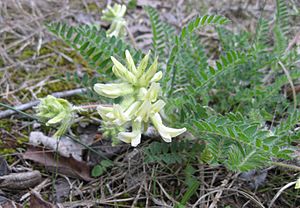Tennessee milkvetch facts for kids
Quick facts for kids Tennessee milkvetch |
|
|---|---|
 |
|
| Conservation status | |
| Scientific classification |
The Tennessee milkvetch (Astragalus tennesseensis) is a type of flowering plant. It belongs to the legume family, which includes plants like peas and beans. This plant is found naturally in the United States. You can find it in states like Illinois, Indiana, Tennessee, and Alabama. Most of these plants grow in Tennessee.
Contents
About the Tennessee Milkvetch
This special plant produces pretty, cream-colored flowers. They usually bloom in April and May. When new plants sprout from seeds, they grow very slowly. It takes several years for them to become old enough to make their own seeds.
How It Survives
The Tennessee milkvetch is very good at living in dry places. It can stay active even when its home is very dry during the summer. This helps it survive in areas that don't get much rain.
Where It Grows
This plant likes to grow in special places called cedar glades. These are open, rocky areas often found in Tennessee. It can also be found on the edges of these glades or in open prairies. Sometimes, it grows in the partial shade of cedar trees. However, it doesn't like too much shade.
Protecting This Plant
The Tennessee milkvetch has almost disappeared from Illinois and Indiana. This is called being "extirpated," meaning it's gone from those specific areas. But people have worked to bring it back. They have planted it again in a few special spots. Some natural groups of these plants have also been found again in Illinois.
A Unique Plant
The Tennessee milkvetch is very special within its plant group, called Astragalus. It is the only plant in its own unique section, called Tennesseensis. This makes it stand out from other plants in the same family.
See also
 In Spanish: Astragalus tennesseensis para niños
In Spanish: Astragalus tennesseensis para niños


